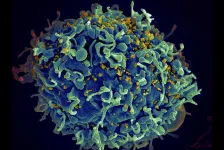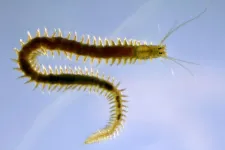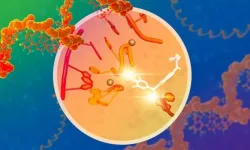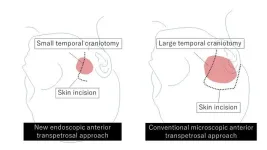(Press-News.org) The reality of the climate impact of long-distance passenger travel has been revealed in new research from the University of Leeds.
Despite only accounting for less than 3% of all trips by UK residents, journeys of more than 50 miles (one way) are responsible for 70% of all passenger travel-related carbon emissions.
The disparity is even greater when international travel is singled-out: international journeys are only 0.4% of total trips but are responsible for 55% of emissions.
The new research, published today in the journal Nature Energy, also shows that targeting long-distance travel may be a more effective way of tackling emissions than current efforts which focus on local and commuter journeys.
Whilst the number of long and short distance domestic journeys by car have fallen slightly over the last 25 years, international air travel has increased significantly, driven by an increase in trips for leisure and visiting friends and family.
Dr Zia Wadud from the University’s Institute for Transport Studies and School of Chemical and Process Engineering and who led the research, said: “The scale of the impact of long-distance travel is very large indeed. That just less than 3% of our trips are responsible for around 60% of miles and 70% of emissions shows how important long-distance travel is in the fight to combat climate change.
“Worryingly, long distance trips, especially flights, have been growing; however, they offer opportunities too.”
Using a new metric they have created, called emission reduction sensitivity, the research team has calculated which types of travel could be changed to maximise a reduction in carbon emissions from passenger travel whilst affecting as few people or trips as possible.
Greater potential from reducing long-distance travel
The research found that if all car journeys under eight miles were shifted to walking or cycling, there would be a 9.3% reduction in carbon emissions. However, around 55% of all journeys would need to be shifted to achieve this, as most travel is done locally and in cars.
Calculated by dividing the carbon reduction percentage by the percentage of journeys altered, the emission reduction sensitivity for this change would be just 0.17 – the lowest recorded in the study.
By contrast, if all flights of less than 1,000 miles were moved to rail, there would be a 5.6% reduction in emissions but only 0.17% of journeys would be affected – resulting in a sensitivity value of 33.2.
At the top end, theoretically limiting everyone who flies now to one return flight abroad per year would have a value of 158.3, as so few journeys would be affected.
The researchers stress that the potential changes are only suggestions meant to make us realise and reassess the impact of our long-distance travel, rather than concrete policy proposals.
Dr Muhammad Adeel, a co-author now at the Centre for Transport and Society at the University of the West of England, added: “Whilst efforts to move local journeys to more sustainable modes of transport are really positive, by omitting aviation emissions from national statistics – as is the case at the moment in nearly all countries – we are not getting a holistic picture and ignoring a large part of the problem.”
A call to rethink our travel’s carbon impact
The researchers also hope that their findings can act as a driver for policymakers to look at changes in how effort is assigned when dealing with the impact of travel on the environment.
The data was collected from the Department for Transport’s National Travel Survey, and the International Passenger Survey, which is organised by the Office for National Statistics.
The research also offers the public an insight into the impact that changing their behaviour could have.
Dr Wadud added: “The important thing both at the policy and personal level is that we prioritise the relatively fewer longer distance trips – especially flights – in order to realize the largest reductions.”
Ends
END
True scale of carbon impact from long-distance travel revealed
The reality of the climate impact of long-distance passenger travel has been revealed in new research from the University of Leeds.
2024-07-02
ELSE PRESS RELEASES FROM THIS DATE:
Cutting-edge genomic test can improve care of children with cancer
2024-07-02
Whole genome sequencing has improved clinical care of some children with cancer in England by informing individual patient care.
New research from the Wellcome Sanger Institute, Cambridge University Hospitals NHS Trust, Great Ormond Street Hospital, and the University of Cambridge, supports the efforts to provide genome sequencing to all children with cancer and shows how it can improve the management of care in real-time, providing more benefits than all current tests combined.
The study, published today (2 July) in Nature Medicine, ...
Drugs that kill "zombie" cells may benefit some older women, but not all, Mayo Clinic study finds
2024-07-02
ROCHESTER, Minn. — Drugs that selectively kill senescent cells may benefit otherwise healthy older women but are not a "one-size-fits-all" remedy, Mayo Clinic researchers have found. Specifically, these drugs may only benefit people with a high number of senescent cells, according to findings publishing July 2 in Nature Medicine.
Senescent cells are malfunctioning cells in the body that lapse into a state of dormancy. These cells, also known as "zombie cells," can't divide but can drive chronic inflammation and tissue dysfunction linked to aging and chronic ...
New lab test to detect persistent HIV strains in Africa may aid search for cure
2024-07-02
New Lab Test to Detect Persistent HIV Strains in Africa May Aid Search for Cure
A multinational team led by Weill Cornell Medicine investigators developed a test that will help measure the persistence of HIV in people affected by viral strains found predominantly in Africa—a vital tool in the search for an HIV cure that will benefit patients around the world.
The study, published in Nature Communications on July 2, helps fill a major gap in human immunodeficiency virus (HIV) research. Most HIV studies have focused on strains circulating in Western countries, predominantly ...
RecombinHunt: predicting new pandemics through data analysis
2024-07-02
Milan, July 2, 2024 - Combating future pandemics through data analysis of recombinant virus genomes. A study published in the prestigious journal Nature Communication presents the promising results of RecombinHunt, a new data-driven method developed by the Department of Electronics, Information and Bioengineering of the Politecnico di Milano and the University of Milan, which can identify, with high accuracy and computational efficiency, recombinant SARS-CoV-2 genomes with one or two breakpoints.
Recombination, that is, the composition of two or more viral genomes to form a new genome, is an efficient molecular mechanism ...
A new breakthrough in understanding regeneration in a marine worm
2024-07-02
The sea worm Platynereis dumerilii is only a few centimetres long but has a remarkable ability: in just a few days, it can regenerate entire parts of its body after an injury or amputation. By focusing more specifically on the mechanisms at play in the regeneration of this worm’s tail, a research team led by a CNRS scientist1 has observed that gut cells play a role in the regeneration of the intestine as well as other tissues such as muscle and epidermis. Even more surprising, the team found that this ability of gut cells to regenerate other tissue varies according to their location: the closer they are to the posterior end of the ...
New molecules to modulate gene expression
2024-07-02
Genoa (Italy)/Grenoble (France) – 2nd July, 2024 - The correct functioning of cells relies heavily on the ability to finely control gene expression, a complex process by which the information contained in DNA is copied into RNA to eventually give rise to all the proteins and most of the regulatory molecules in the cell. If DNA can be imagined as a dense technical manual, gene expression is the method by which the cell extracts useful information from it.
Researchers at the Istituto Italiano di Tecnologia (IIT) in Genoa and the European Molecular Biology Laboratory (EMBL) in ...
Study shows hairy skin does not become less sensitive with age
2024-07-02
Like most primates, humans are remarkably touchy-feely. Starved of touch, we release more of the stress hormone cortisol, which causes the immune system to be down-regulated and the heart rate and blood pressure to go up. On the other hand, touch causes the brain to be flooded by natural opioids, the ‘bonding hormone’ oxytocin, and the ‘feel-good’ neurotransmitters dopamine and serotonin.
It is generally assumed that our sense of touch worsens with age, just like our vision and sense of hearing. However, new results are good news for those who wished they could stave off age-related decline forever: they show for the first time that a deterioration ...
Safer, swifter, smaller scar: new brain surgery approach targets difficult tumors at skull base
2024-07-02
Tumors arising in the base of the skull are among the most difficult to remove in neurosurgery. The current treatment method is to perform surgical removal by what is known as the microscopic anterior transpetrosal approach (ATPA). Seeking to lessen the risk of damage and postoperative complications, as the skull base is densely packed with nerves, blood vessels, and other tissues, not to mention the brain stem, an Osaka Metropolitan University medical research team is taking a new approach.
Led by Dr. Hiroki Morisako, a lecturer in ...
Barriers to care: transgender and gender-diverse peoples’ health care experiences
2024-07-02
Transgender, nonbinary, and gender-diverse people face barriers to accessing surgery and to the health system in general, describe authors in two new research papers published in CMAJ (Canadian Medical Association Journal).
In many areas of life, people who identify as transgender, nonbinary, and gender diverse experience discrimination even where there are laws to protect transgender human rights. Health systems also pose barriers for transgender, nonbinary, and gender-diverse people, who are more likely to delay obtaining ...
Study explores what motivates people to watch footage of disasters and extreme weather
2024-07-02
Extreme weather events such as hurricanes and storms have increased in both frequency and severity in recent years.
With that has come heightened public interest, resulting in often dramatic footage being live-streamed on platforms such as YouTube, TikTok and Discord.
Now, a new study conducted at the University of Plymouth has for the first time analysed what might be motivating people to watch these streams – in some instances for up to 12 hours at a time.
The research centred around the live-streaming ...
LAST 30 PRESS RELEASES:
Start school later, sleep longer, learn better
Many nations underestimate greenhouse emissions from wastewater systems, but the lapse is fixable
The Lancet: New weight loss pill leads to greater blood sugar control and weight loss for people with diabetes than current oral GLP-1, phase 3 trial finds
Pediatric investigation study highlights two-way association between teen fitness and confidence
Researchers develop cognitive tool kit enabling early Alzheimer's detection in Mandarin Chinese
New book captures hidden toll of immigration enforcement on families
New record: Laser cuts bone deeper than before
Heart attack deaths rose between 2011 and 2022 among adults younger than age 55
Will melting glaciers slow climate change? A prevailing theory is on shaky ground
New treatment may dramatically improve survival for those with deadly brain cancer
Here we grow: chondrocytes’ behavior reveals novel targets for bone growth disorders
Leaping puddles create new rules for water physics
Scientists identify key protein that stops malaria parasite growth
Wildfire smoke linked to rise in violent assaults, new 11-year study finds
New technology could use sunlight to break down ‘forever chemicals’
Green hydrogen without forever chemicals and iridium
Billion-DKK grant for research in green transformation of the built environment
For solar power to truly provide affordable energy access, we need to deploy it better
Middle-aged men are most vulnerable to faster aging due to ‘forever chemicals’
Starving cancer: Nutrient deprivation effects on synovial sarcoma
Speaking from the heart: Study identifies key concerns of parenting with an early-onset cardiovascular condition
From the Late Bronze Age to today - Old Irish Goat carries 3,000 years of Irish history
Emerging class of antibiotics to tackle global tuberculosis crisis
Researchers create distortion-resistant energy materials to improve lithium-ion batteries
Scientists create the most detailed molecular map to date of the developing Down syndrome brain
Nutrient uptake gets to the root of roots
Aspirin not a quick fix for preventing bowel cancer
HPV vaccination provides “sustained protection” against cervical cancer
Many post-authorization studies fail to comply with public disclosure rules
GLP-1 drugs combined with healthy lifestyle habits linked with reduced cardiovascular risk among diabetes patients
[Press-News.org] True scale of carbon impact from long-distance travel revealedThe reality of the climate impact of long-distance passenger travel has been revealed in new research from the University of Leeds.





